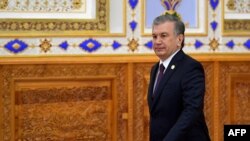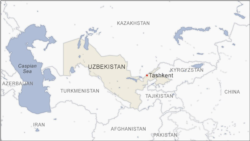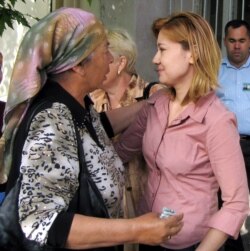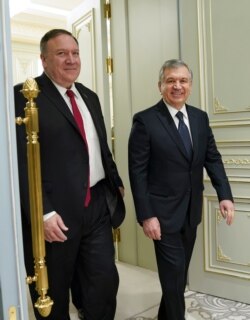The continued incarceration of a blogger in Uzbekistan for allegedly spreading extremist content has angered rights activists, with some Uzbek intellectuals accusing the government of President Shavkat Mirziyoyev of using counterextremism laws to go after political dissent.
Akrom Malik, a 30-year-old academic and government critic, was arrested in June 2016 for allegedly writing articles under the pseudonym Abdulloh Nusrat and promoting the banned People’s Movement of Uzbekistan. Malik was sentenced in Tashkent, the capital, in January 2017 to six years in prison for anti-constitutional crimes, namely “disseminating religious extremism” through his social media writing.
“Akrom Malik’s case is the biggest shame for Uzbekistan in the 21st century,” said Agzam Turgunov, 69, a prominent Uzbek human rights activist who was released in 2017 after serving more than nine years of his 10 year prison term.
“Malik should not have been arrested in the first place,” said Turgunov, adding “President Mirziyoyev did the right thing not to pardon him, because Malik is not a criminal to be pardoned.”
Defending the blogger for his critical posts, Turgunov said the authorities were afraid that Malik could stir public opinion against “the wrongdoings” of the government. “This is exactly what the government fears of,” he added.
Home to nearly 33 million people, the Central Asian nation has often been criticized for its “totalitarian practices.” Human Rights Watch (HRW) has described the country’s human rights situation as “abysmal.”
Mirziyoyev, who assumed power in 2016 following the death of former leader Islam Karimov, has promised dramatic reforms geared toward improving the country’s human rights record. The pledged changes were seen as a major break from Karimov, who had ruled the country with an iron fist since its independence in 1991 until his death in September 2016.
According to International Partnership for Human Rights (IPHR), Mirziyoyev has taken some positive steps, including reforming the criminal justice system, releasing dozens of government critics from prison, lifting a ban on some critical websites, amending legislation to prevent torture, and, most notably, closing the notorious Jaslyk Prison, a symbol of Uzbekistan’s practice of torturing jailed government critics.
“However, we see that despite a series of policy decisions apparently intended to address human rights violations, and torture in particular, little has changed in practice,” said Brigitte Dufour, the director of IPHR, adding that Uzbek authorities have failed to engage in an “honest and open dialogue” on improving human rights with the country’s civil society.
“We continue to receive reports that human rights activists in Uzbekistan are under surveillance, subjected to harassment from security services and unable to speak out freely,” Dufour said.
Last month, nearly 100 intellectuals and activists in Uzbekistan signed a petition asking Mirziyoyev to release Malik. Malik, according to the activists, has been unjustly convicted and subjected to torture.
Turgunov, one of the activists lobbying for Malik, told VOA that Uzbek government departments, including the National Human Rights Centre, have decided to remain quiet about the case despite repeated calls for an action.
VOA has not received a response for comment from the Uzbek Ministry of Foreign Affairs.
Some human rights activists contend Malik’s imprisonment shows the Uzbek government remains intent on keeping a tight control over the society, particularly on matters related to religious freedom.
“Some religious prisoners were released when Mirziyoyev came to power, but this year there were new arrests for belonging to one or another religious group,” Umida Niyazova, the director of Berlin-based Uzbek Forum for Human Rights, told VOA.
The renewed crackdown on religious activists, Niyazova said, indicates the authorities “fear the repetition of events of the early 1990s, when the relative liberalization of society led to the creation of religious organizations that had influence and support among the traditionally religious Uzbek society.”
A former Soviet republic, Uzbekistan recognizes religious freedom within the framework of a secular government as outlined in its constitution. However, rights organizations say the Uzbek authorities continue to prevent people from practicing their religious beliefs, with restrictions on wearing hijab and growing a beard. According to U.S. government estimates, almost 88% of the population is Muslim.
The Uzbek parliament in 2018 approved its religious freedom “roadmap” to ease rules about the registration of religious organizations. The government later that year said it had released from prison or reduced the sentences of 575 people convicted of religious extremism.
At the release of the U.S. State Department’s 2019 Report on International Religious Freedom in June, Secretary of State Mike Pompeo highlighted Uzbekistan among countries that had taken positive steps in extending religious liberty for their citizens during the past year.
“In Uzbekistan, steps have been taken to improve its record on religious freedom, and those steps continue. ... We documented no police raids of unregistered religious group meetings during 2019, compared with 114 such raids in 2018, and 240 the year before that,” Pompeo said.
In a recent interview, U.S. Ambassador at Large for International Religious Freedom Sam Brownback praised the Uzbek government for taking significant measures on religious freedom.
“In Uzbekistan, steps have been taken to improve its record on religious freedom, and those steps continue," Brownback said.
Despite this, HRW in its 2020 World Report said thousands of people, “most of them peaceful religious believers” are jailed on extremism charges.
Luca Anceschi, a senior lecturer of Central Asian Studies at the University of Glasgow in Scotland, told VOA that Mirziyoyev in his “authoritarian modernization” remains focused on economic development and growing welfare of the population.
“The human dimension seems to be quite peripheral to the reform agenda promoted by Shavkat Mirziyoyev,” Anceschi said.
He said the current government in Uzbekistan needed to also address the issue of “justice for crimes committed by the prior regime,” adding that the leadership in Tashkent has yet to commit to significant progress in protecting dissent, guaranteeing pluralism, and freedom of opinion.
VOA’s Malik Mansur contributed to this report.















